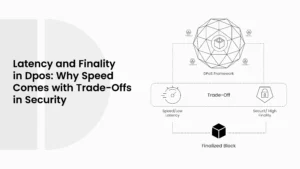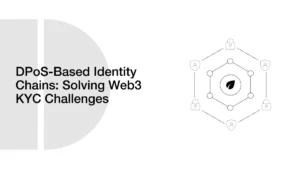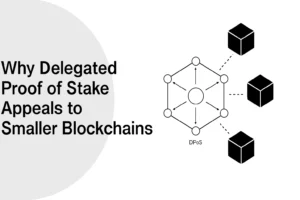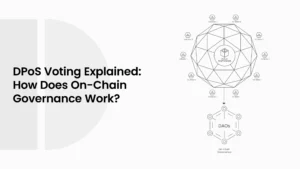Blockchain Governance Is Changing: Why DPoS Is Moving Toward DAOs
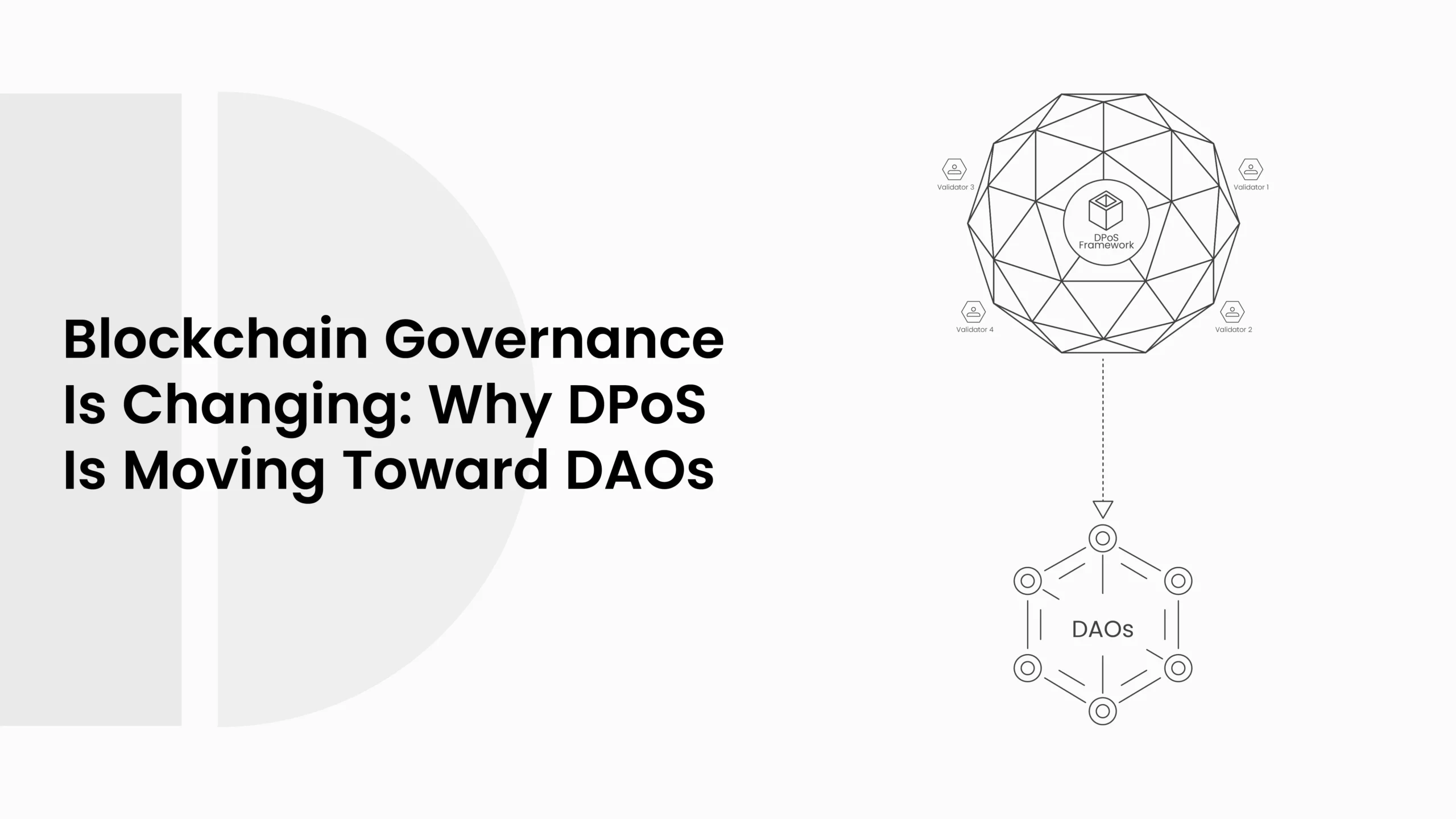
Blockchain is always changing. At first, it was just about sending money with Bitcoin. Later, it became about smart contracts with Ethereum. Now, blockchains are also about how people can work together and fairly make decisions.
- What is Delegated Proof of Stake (DPoS)?
- Validators: The Core of DPoS
- Comparison of Validator Roles Across Networks
- The Push Toward Decentralized Autonomous Organizations (DAOs)
- What is a DAO in Simple Words
- How DAOs Work in Practice
- Why DAOs Fit With DPoS
- Why DPoS Needs DAOs
- Centralization Problems in DPoS
- Lack of Transparency
- Token Holder Apathy
- How DAOs Solve These Issues
- Case Study: Blockchain Voting and DAOs
- E-Voting as a Test Case
- What PDPoS Means
- Why DAOs Matter Here
- The Big Lesson
- From Validator Elections to DAO Governance
- How Validator Elections Work Today
- Moving Toward DAO Systems
- Proposals and Referendums
- More Transparency and Accountability
- Governance Flow Shift
- Benefits of DAO-Driven DPoS
- Higher Transparency
- Better Scalability with Automated Rules
- Community Treasury Management
- Lower Risk of Collusion
- Stronger Protection Against Voter Fatigue
- Technical Layer: Smart Contracts in DAO-DPoS
- What Are Smart Contracts?
- How Smart Contracts Automate Governance
- Examples in Real Networks
- Why Smart Contracts Matter for DAOs
- Challenges Ahead
- Smart Contract Bugs and Hacks
- Legal and Regulatory Uncertainty
- Low Participation and Voter Fatigue
- Balancing Efficiency and Inclusivity
- Key Challenges Moving to DAO-DPoS
- Future of DPoS with DAOs
- Hybrid Governance Models
- Cross-Chain Governance
- AI-Assisted Decision Making
- Reputation Voting and New Consensus Ideas
- Long-Term Vision
- Conclusion
- Frequently Asked Questions About The Next Evolution of DPoS
- What is Delegated Proof of Stake (DPoS)?
- How is a DAO different from DPoS?
- Why does DPoS need DAOs?
- What is Prioritized DPoS (PDPoS)?
- What challenges do DAOs in DPoS face?
- Glossary of Key Terms
One of the main systems for running blockchains is called Delegated Proof of Stake, or DPoS. This system lets people who hold coins vote for a smaller group of trusted people called validators or delegates. These validators run the network, make blocks, and keep things safe.
But DPoS is not perfect. There are some cases when a few big players dominate the majority of the votes. This raises issues of fairness and trust. This is why blockchains are now transitioning to bigger and open systems than simple validator systems. The next step is the emergence of DAOs or autonomous organizations.
DAOs are groups on the blockchain where rules are written in code. They let communities decide together how money, upgrades, and governance should work. In short, the story of DPoS is moving from validators toward DAOs. This blog will explain that journey, why it matters, and how it shapes the next step in blockchain evolution.
ALSO READ: DPoS Forks and Upgrades: How Protocol Evolution Really Works
What is Delegated Proof of Stake (DPoS)?
To understand the future, people need to first understand how DPoS works. A blockchain is a chain of blocks filled with transactions. But to add new blocks, the system needs a way for everyone to agree. This is called a consensus mechanism.
The first consensus was Proof of Work (PoW), used by Bitcoin. Miners solve math puzzles, and the winner adds the block. This is safe, but it uses a lot of energy. Then came Proof of Stake (PoS). In PoS, people lock their coins as a stake, and the system picks one of them to add the block. This is cheaper and faster than PoW.
Delegated Proof of Stake (DPoS) goes one step further. Instead of everyone staking and waiting to be picked, coin holders vote for a small group of delegates. These delegates are like elected officials. They are the ones who validate transactions and create blocks.
The good side of DPoS is speed. Because very few delegates are working at any given time, the speed of transactions is significantly higher than in PoW and PoS. The undesirable side is centralization. When there are just 20 or 30 delegates in charge, it means that a few whales (large token holders) can dictate the winner. This reduces fairness.
DPoS is used in big blockchain networks like EOS and TRON. It has helped these networks process thousands of transactions per second. But over time, people realized that DPoS also needs more transparency and community control. That is where DAOs enter the story.
Validators: The Core of DPoS
Validators are the backbone of Delegated Proof of Stake systems. They are the people or groups that keep the chain alive. In simple words, they are the ones who confirm transactions, make new blocks, and protect the network from fraud. Without validators, no DPoS chain can run.
When a person holds tokens on a DPoS chain, they cannot directly add blocks. Instead, they vote for validators or block producers. The validators with the most votes are chosen to take turns making blocks. They also get rewards for doing this work, and those rewards are usually shared with the people who voted for them.
The validator position of the role might seem reasonable initially, but it is not necessarily so simple. In most instances, the decision on who makes a validator is taken by a few big token holders. This implies that power is accumulated by a few individuals. Once that occurs, the system begins to appear less decentralized but rather controlled, which is the very last thing that blockchain promised at the start.
Different blockchains use validators in different ways. For example, EOS uses only 21 active validators at a time. TRON uses 27, and Cosmos uses more than 180. The higher the number of validators, the more voices get included. But higher numbers can also slow things down. This is why every network has to balance speed with fairness.
Comparison of Validator Roles Across Networks
| Network | Validator Count | Block Time | Governance Style | Known Issue |
| EOS | 21 | 0.5 sec | Delegate voting | Cartel risk |
| TRON | 27 | 3 sec | Delegate voting | Takeover risk |
| Cosmos | 180+ | 6 sec | Hybrid DPoS/PoS | High stakes needed |
As the table shows, each network has its own way of managing validators. EOS and TRON are very fast because they have fewer validators, but they face big risks of centralization. Cosmos tries to include more validators, which gives better decentralization, but it needs very high stakes to join.
ALSO READ: The Future of Validator Nodes in DPoS: Hardware, Geography, and Centralization
The big lesson here is that validators are both the strength and the weakness of DPoS. They make the system run faster and cheaper than PoW, but they also bring in new risks of power concentration. This is the exact point where DAOs can help. Instead of leaving power solely with validators, DAOs enable the entire community to participate in decision-making.
The Push Toward Decentralized Autonomous Organizations (DAOs)
What is a DAO in Simple Words
A decentralized autonomous organization (DAO) is a sort of online community that is self-sovereign and executes rules in the form of code. Rather than leaders voting on behalf of the closed-door deals, members of a DAO vote on actions. The regulations are saved in smart contracts, a blockchain program. When these rules are established, no one can alter them secretly.
How DAOs Work in Practice
In a DAO, members give a proposal. Such proposals may be on anything, including expenditure of community funds, implementation of new features, or implementation of a new governance model. It is then voted on by the members, and in case the proposal is approved, the smart contract will cause it to come to pass. This eliminates the use of intermediaries and enhances transparency in governance.
Why DAOs Fit With DPoS
DPoS is already based on voting, but right now it mostly ends with electing validators. DAOs expand that idea. Instead of just voting for validators, people can also vote on rules, budgets, and upgrades. That makes DPoS less about only validators and more about whole community control.
Why DPoS Needs DAOs
Centralization Problems in DPoS
One of the biggest problems with DPoS is centralization. Since only a few validators are active at a time, power often stays in the hands of the same groups. Whales can decide who wins, and this makes the system feel less fair. In some cases, backroom deals between validators reduce trust.
Lack of Transparency
Another issue is that many agreements between validators happen off-chain, meaning normal token holders cannot see them. This lowers confidence in the network. People want to know how decisions are made and why certain validators get rewards.
Token Holder Apathy
Even though token holders can vote, many do not bother. This voter fatigue happens because people feel their vote does not change much. DAOs can fix this by making voting about more than just validators. They can add fun and meaningful proposals that keep the community engaged.
How DAOs Solve These Issues
DAOs bring transparency because every decision is recorded on-chain. They also create better incentives by rewarding participation with governance tokens or other benefits. By spreading decision-making beyond validators, DAOs make DPoS more balanced and more open to community input.
Case Study: Blockchain Voting and DAOs
E-Voting as a Test Case
The most difficult technological issue is electronic voting. It needs trust, transparency, and a high level of protection against fraud. Researchers have been exploring the way that voting can be more secure with blockchain. A potential model is known as Prioritized Delegated Proof of Stake (PDPoS).
What PDPoS Means
In PDPoS, votes are given different levels of priority. For example, in a national election, emergency votes or health-related decisions can be processed faster than routine ones. Validators are chosen not only by votes but also by importance levels. This adds flexibility and makes the system more practical for real-world governance.
Why DAOs Matter Here
A recent study by Razaque et al. (2025) showed how PDPoS can make e-voting more transparent and efficient. The study suggested that smart contracts and DAO-like structures could help manage priorities and disputes in voting systems (Razaque, Bektemyssova, Yoo, et al., 2025). This shows how DAOs can improve not just blockchain networks but also large-scale public systems like elections.
The Big Lesson
The move from validators to DAOs is not just about technology. It is about building trust. Validators keep the network alive, but DAOs make sure decisions are open and fair. If e-voting can be improved by combining DPoS and DAOs, then blockchain governance can too.
From Validator Elections to DAO Governance
How Validator Elections Work Today
In DPoS, token holders vote for validators. The top ones by votes get chosen to create blocks. This works fast, but it is limited. Once validators are elected, most decisions happen behind closed doors. Token holders don’t see how deals are made, or how resources are managed.
Moving Toward DAO Systems
With DAOs, elections do not stop at choosing validators. Token holders can also vote on how validators should behave, what rules they must follow, and how community funds should be spent. Smart contracts enforce these rules, so validators cannot break them without losing rewards.
Proposals and Referendums
In DAO-driven DPoS, anyone in the community can create proposals. These proposals can be about upgrades, funding new tools, or changing validator rewards. Instead of only delegates making the calls, the whole community has a say. Voting can happen directly on-chain, creating open and auditable records.
More Transparency and Accountability
This shift turns validators into DAO members who are bound by code. Their rewards, penalties, and actions become visible on-chain. This makes it harder for hidden alliances or unfair collusion to happen. Every decision can be traced, and every vote is recorded.
ALSO READ: Learning from Failures: Post-Mortems of Abandoned DPoS Projects
Governance Flow Shift
| Stage | Old DPoS | DAO-Based DPoS |
| Electing | Token weighted votes | Token + reputation + DAO rules |
| Decision | Closed delegate talks | Open smart contract votes |
| Rewards | Block pay only | DAO treasury distribution |
| Risk | Centralization | Broader accountability |
This table shows how the governance flow changes when DAOs are added. Old DPoS puts most of the power into validator elections. DAO-based DPoS spreads power into open votes, community treasuries, and smart contracts.
Benefits of DAO-Driven DPoS
Higher Transparency
One of the strongest benefits of DAO-driven DPoS is transparency. In old systems, deals between validators were often hidden. With DAOs, all proposals and votes are recorded on-chain. Anyone can check them, which builds trust.
Better Scalability with Automated Rules
DAOs have smart contracts that enable a lot of processes to be automated. Rules such as validator rewards or penalties can be coded and run immediately as opposed to waiting until humans make decisions on the same. This keeps the system fast while still being fair.
Community Treasury Management
In many blockchains, validator rewards and transaction fees go only to block producers. DAO-based DPoS changes this by letting the community decide how to use a shared treasury. Funds can be spent on ecosystem growth, developer grants, or even marketing. This spreads benefits beyond just validators.
Lower Risk of Collusion
Collusion occurs when voters conspire together to vote and distribute profits. The rules in DAO are coded, and votes are transparent. This complicates collusion and puts more responsibility on it.
Stronger Protection Against Voter Fatigue
When token holders only vote for validators, they may lose interest. DAO-driven systems give them more reasons to vote, not just for delegates, but also for upgrades, rules, and budgets. More proposals mean more chances to stay active in governance.
Technical Layer: Smart Contracts in DAO-DPoS
What Are Smart Contracts?
Smart contracts are pieces of code stored on the blockchain. They run automatically when certain conditions are met. Think of them like digital vending machines; once you insert the right input, the machine always gives the same output. Nobody can change the rules in secret.
How Smart Contracts Automate Governance
In DAO-driven DPoS, smart contracts handle many governance tasks. They can automatically:
- Distribute validator rewards.
- Slash (penalize) bad actors.
- Record votes on proposals.
- Transfer funds from the treasury to approved projects.
This automation reduces human error and makes sure the rules are always followed.
Examples in Real Networks
- In Cosmos, governance proposals are handled on-chain, and smart contracts can distribute community funds.
- In EOS, block producer rewards are managed by coded rules, though some decisions still happen off-chain.
- New models like Prioritized DPoS (Razaque et al., 2025) show how smart contracts can add flexibility for special cases like e-voting.
Why Smart Contracts Matter for DAOs
Without smart contracts, DAOs would just be online forums. With them, DAOs become real governing systems where code enforces rules. For DAO-based DPoS, this means fewer hidden deals, faster decisions, and fairer outcomes for all token holders.
Challenges Ahead
Smart Contract Bugs and Hacks
Although smart contracts lead to automation, they may break as well. Hacks that occur may be brought about by bugs in the code or untested contracts. History has shown examples like the 2016 DAO hack on Ethereum. If a DAO-based DPoS system has a weak contract, attackers could drain funds or change rules unfairly.
Legal and Regulatory Uncertainty
Governments are still figuring out how to treat DAOs. Some countries see them as companies, others don’t recognize them at all. This legal gray area makes it hard to know who is responsible if something goes wrong. For blockchains running DAO-based DPoS, unclear laws can create risk for both developers and token holders.
Low Participation and Voter Fatigue
Even with more proposals and transparency, many token holders may still not vote. Some feel their small stake doesn’t matter. Others find the process confusing. Without enough participation, DAOs may end up controlled by a small group, repeating the same problem DPoS already has.
Balancing Efficiency and Inclusivity
If too many proposals are submitted, governance can become slow. Voting on every small detail may overload the system. DAO-based DPoS needs to balance efficiency with inclusivity, making sure decisions happen fast but still give everyone a voice.
Key Challenges Moving to DAO-DPoS
| Challenge | Description | Possible Fix |
| Smart contract risks | Bugs and hacks in code | Regular audits + community testing |
| Regulation | No legal clarity in many countries | New legal frameworks + compliance |
| Participation | Token holders lose interest in voting | Incentives + easier voting tools |
| Scaling | Too many proposals slow down decisions | Layer-2 voting + priority rules |
This table shows the main issues DAO-driven DPoS systems face. Each challenge has a potential solution, but none are perfect. It will take both technology and community effort to make governance smooth and reliable.
ALSO READ: Why Delegated Proof of Stake (DPoS) Appeals to Smaller Blockchains
Future of DPoS with DAOs
Hybrid Governance Models
The future of Delegated Proof of Stake will likely not be purely DPoS or purely DAO. Instead, hybrid models will emerge. These systems could mix token-weighted voting with reputation scores, community DAOs, and even AI-driven decision-making. For example, validators might still be elected, but their actions could be monitored and scored by DAO rules. A combination of token votes and reputation points could then decide if they stay in power.
Cross-Chain Governance
As blockchains become more connected, governance will need to stretch across multiple networks. DAO-driven DPoS could allow decisions that affect more than one chain at a time. For example, a DAO on a Cosmos-based chain could coordinate with DAOs on Polkadot or Avalanche for cross-chain upgrades. This will require interoperability, but it could make governance much more powerful and unified.
AI-Assisted Decision Making
Artificial intelligence is slowly being tested in governance systems. In a DAO-driven DPoS, AI could help filter proposals, detect collusion among validators, or even predict voter participation trends. While AI would not replace human decisions, it could act as a support tool, making governance more efficient and data-driven.
Reputation Voting and New Consensus Ideas
Researchers are already looking into Reputation Voting Consensus, where votes are weighted not only by tokens but also by community reputation. This could reduce whale dominance while rewarding long-term honest behavior. Studies by Xiao et al. (2020) and Zhou et al. (2023) show how new consensus mechanisms are forming to balance speed, fairness, and decentralization. DAO-based DPoS may borrow these features to create smarter voting models.
Long-Term Vision
In the long run, DAO-driven DPoS could move blockchains closer to being true digital democracies. Instead of a few validators holding most of the power, decisions would spread across token holders, DAOs, and smart contracts. With more transparency, cross-chain connections, and possibly AI support, governance could become fairer, scalable, and future-ready.
Conclusion
Delegated Proof of Stake has been a major step forward in blockchain governance. It showed that token holders could elect validators and keep networks running faster and cheaper than Proof of Work. But it also revealed limits, centralization risks, hidden deals, and voter apathy.
The next stage is clear: moving from validators to DAOs. By using smart contracts, open proposals, and community treasuries, DAO-driven DPoS creates a system that is more transparent, fair, and scalable. Validators will still play a role, but they will work within clear rules written in code and enforced by the community.
Looking ahead, everyone can expect hybrid models that mix token votes with reputation, cross-chain governance powered by interoperability, and even AI tools to help with decision-making. DAO-based DPoS is not just an upgrade; it is the natural evolution of decentralized governance.
Frequently Asked Questions About The Next Evolution of DPoS
What is Delegated Proof of Stake (DPoS)?
DPoS is a consensus system where token holders vote for a small group of validators. These validators create blocks and keep the blockchain secure.
How is a DAO different from DPoS?
DPoS is mostly about electing validators, while a DAO is about open community governance. In a DAO, members can vote on upgrades, budgets, and rules using smart contracts.
Why does DPoS need DAOs?
DPoS often suffers from centralization and hidden deals. DAOs make governance transparent, record every vote on-chain, and let the whole community take part in decisions.
What is Prioritized DPoS (PDPoS)?
It’s a new model where votes can have priority levels, such as handling urgent issues first. Researchers suggest combining it with DAOs to improve real-world systems like e-voting.
What challenges do DAOs in DPoS face?
Main issues include smart contract bugs, unclear legal rules, low voter participation, and the risk of too many proposals slowing down governance.
Glossary of Key Terms
- Blockchain: A digital ledger that records transactions in blocks, linked together securely.
- Consensus Mechanism: A system that helps all blockchain users agree on the state of the network.
- Proof of Work (PoW): A consensus model where miners solve puzzles to create blocks.
- Proof of Stake (PoS): A system where people lock tokens as a stake and are chosen to validate blocks.
- Delegated Proof of Stake (DPoS): A faster model where token holders elect validators to run the chain.
- Validator: A trusted node that creates blocks and checks transactions.
- DAO (Decentralized Autonomous Organization): A group managed by smart contracts where decisions are made by community voting.
- Smart Contract: Code stored on a blockchain that runs automatically when conditions are met.
- Treasury: A shared pool of funds managed by a DAO for community use.
- PDPoS (Prioritized Delegated Proof of Stake): A new model where votes and decisions are ranked by urgency or importance.

